Did Ben Carson Violate a Federal Law at Trump’s Campaign Rally?
The HUD secretary was introduced with his official title, which could run afoul of the Hatch Act.
Ben Carson spoke of God, shared values, his career as a surgeon and the fleeting nature of life itself in a short address at a campaign rally for President Trump on Tuesday. At no point did he discuss his current job, the secretary of the Housing and Urban Development Department.
That title, however, is exactly how he was introduced, which could now land him in hot water. The 1939 Hatch Act allows federal officials to attend and speak at political events, but they must do so in a personal, rather than official, capacity. Carson blurred that line when he was introduced as HUD secretary and by failing to clarify he was speaking at the rally solely as a private citizen.
Jerry Brown, a HUD spokesman, said the department does not "believe there was a Hatch Act violation," but noted it is "consulting with [its] ethics office on the matter to ensure it doesn’t occur again." Carson, Brown explained, simply "did not hear his name before he was cued to go on."
The secretary could face repercussions if an individual files a complaint with the Office of Special Counsel, which serves at the Hatch Act enforcer for the federal government, and the agency decides to investigate. Nick Schwellenbach, a former OSC official, said in any complaint against a presidentially appointed, Senate-confirmed employee, investigators would examine how the appointee was introduced. They would likely ask whether Carson asked for his title not to be used and the event organizers went against his wishes.
Brown said HUD was unaware of "what instructions, if any, were provided to the announcer," but emphasized that "all other references during the event refer to him as Dr. Carson."
Carson appears to be in the clear of other possible violations, such as soliciting campaign contributions or mixing up official duties with campaign activity. Brown said the department incurred no costs for Carson's travel and lodging. OSC would determine whether Carson had knowledge of Hatch Act restrictions, but the secretary would likely encounter difficulty using that excuse.
“All Cabinet officials should have received Hatch Act training at the beginning of their tenure,” said Schwellenbach, now the director of investigations at the Project on Government Oversight. “Ethics officials are pretty good about including this training early on and they or OSC should be consulted if there is any concern that involvement in campaign activities could cross the line.”

How well do you know the Hatch Act?
OSC cited Carson’s predecessor, Julian Castro, for violating the Hatch Act during an interview with Yahoo News last year.
Castro’s statements “mixed his personal political views with official agency business despite his efforts to clarify that some answers were being given in his personal capacity,” OSC said. “Federal employees are permitted to make partisan remarks when speaking in their personal capacity, but not when using their official title or when speaking about agency business.”
Castro discussed both his support for Hillary Clinton and his belief that then-candidate Donald Trump was unfit for office. OSC did not recommend a punishment, instead deferring to President Obama. Kathleen Sebelius, secretary of the Health and Human Services Department in Obama’s first term, also ran afoul of the Hatch Act in 2012 when she spoke at what was initially billed as an official event but endorsed a gubernatorial candidate and Obama’s re-election.
Update: This story has been updated with comment from HUD.







